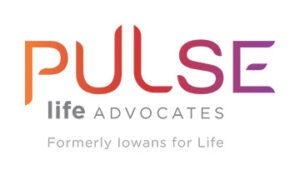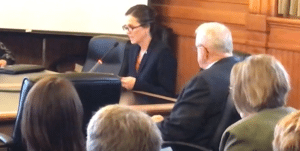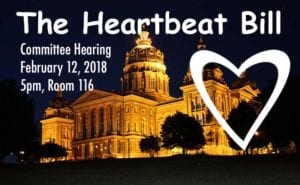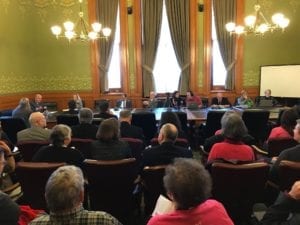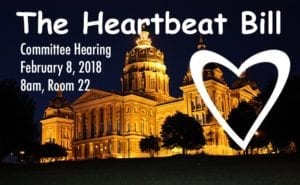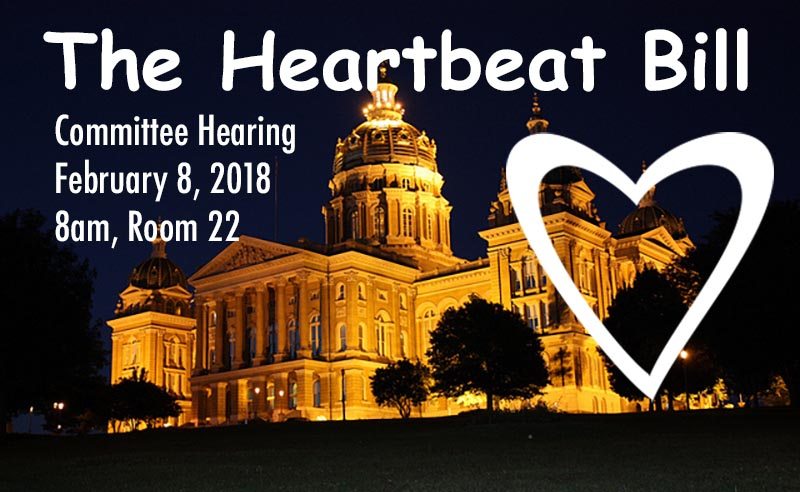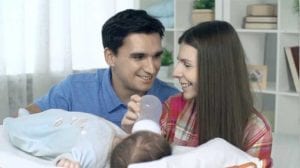Hi, I’m Laura Limmex. I am the Executive Director of Restored by Grace and I’m a founding member of The Coalition.
I too had an abortion at the age of 16, and for many years I denied the fact of what happened that day and the memories of what happened that day. Today I work with women across the state of Iowa and this Midwest region who are struggling following the decision to have an abortion.
Abortion takes the life of a baby
Human abortion doesn’t resolve problems
It left them to navigate grief, guilt, remorse, anger, depression, anxiety. Things that they thought were being resolved with the abortion were only escalated. They were affected mentally, emotionally, many times physically and spiritually.
I’m going to be brief and just end with a couple questions.
As a community, Nation, State what do we value? Should not our legislators as representatives protect and stand up for people who are young both before birth and after?
Thank you.
[The above is a transcript of Laura Limmex’s testimony before the Iowa Senate’s subcommittee on the Heartbeat Bill, SSB 3143, on February 8th. The full committee debates the bill today in room 116. Please attend beginning at 4PM to show your support.]
[subscribe2]
[Here is a transcript of Kim Laube’s testimony before the Iowa Senate’s subcommittee on the Heartbeat Bill, SSB 3143, on February 8th.]
I am Kimberly Laube, Director of Life Ministries for Lutheran Family Service. I direct the adoption agency and pregnancy counseling program that began in 1901 in Fort Dodge, Iowa.
I would like to address the question:
Does Iowa have the infrastructure to handle the number of children born to women who would have otherwise sought an abortion if were not for a law prohibiting them from an abortion after a heart beat is detected?
Currently Iowa reports abortion statistics in terms of those prior to 13 weeks gestation and those after 13-week gestation. In 2014, according to The State of Iowa’s Vital Statistic Report, 283 children were aborted either surgically or medically that were over the age of 13 weeks. All other abortions, which totaled 3732, were performed at gestational age 0-13 weeks.
We do not know the exact number, because but we can use national statistics to help us reach a good estimated number.
According to Guttmacher Institute, two thirds of women have an abortion prior to 8 weeks gestation. Using that statistic 1232 of the 3732 women who were reported to have abortions before 13 weeks would have had their abortion after a heart beat could be detected and would have been prevented from doing so.
The adoption option
Using those assumptions, In the state of Iowa there may be 1,515 children being born to mothers who otherwise would have had an abortion.
The National Council for Adoption has complied quite a bit of data surrounding adoption and abortion. There is a national adoption rate of 7 babies to every 1000 babies aborted or born to unwed mothers in the United States. This is called the Adoption Option Index.
The National Council for Adoption broke out their numbers further and reported on the Adoption Option Index state by state.
Iowa is an adoption friendly state
There were some very important findings… important enough that I would like to quote The National Council for Adoption about their findings. Here is what they had to say.
In 2014, four states had Adoption Option Indexes three or more times higher than the national average-Utah (36.3), Arkansas (26.8), Montana (23.1), and Iowa (21.4). There were two to four adoptions for every 100 abortions plus births to unmarried women in these states. This suggests that in these states women may have more extensive counselling, services, and facilities to orient pregnant women towards adoption-among other factors.
That’s good news!
Iowa’s Adoption Option Index appears to show that we currently have an infrastructure that helps us succeed at least three or four times the national average!
According to various sites, including the Federalists, American Adoptions and other websites, it is common to use the statistic of 2 Million American Couples are waiting to adopt.
That is approximately 36 couples waiting for every one infant adoption.
If you are one of those couples, then you might find the information at https://www.gofundme.com/c/blog/adoption-financial-assistance very useful, especially if you are concerned about funds like so many others. However, despite all of this, it is not realistic to believe that all 1,515 extra births in Iowa annually would be placed for adoption. Our Adoption Index would indicate it is somewhere around an additional 30 children who would be placed for adoption. There are multiple adoption agencies throughout Iowa besides Lutheran Family Service who could easily absorb an additional 30 placements. These children would still be able to know about their pasts with the advanced technology and genealogy these days, as there are sites like https://www.genealogybank.com/explore/census/1910-records which are available for each year, and so adoptees won’t go without knowing about their heritage and who they are.
Some of course will be parented and may rely on welfare or other state aid. But, Vital Statistics indicate that about 60% of the women seeking abortions in Iowa have some college education which will make them less likely to need welfare assistance throughout their life time.
It will remain to be seen the impact this bill will have on our infrastructures, welfare, Medicaid and adoption, but there are some indicators here that lead me to believe we have a good foundation for support.
I rise in favor of SSB 3143 and rejoice in the 1515 lives it will save annually.
[The Heartbeat Bill needs YOUR help this Monday. Can you attend a crucial hearing Senate subcommittee hearing Monday, February 12th, 5PM, in room 116? Planned Parenthood will be out in force. Pro life proponents need to show their support. Be sure to read/watch Maggie Dewitte’s testimony.]
[Here is a transcript of Scott Valencia’s remarks before an Iowa Senate subcommittee in support of the proposed Heartbeat Bill legislation. Mr. Valencia is Executive Director of the NATURAL JOURNEY ALLIANCE and Chairperson of THE COALITION OF PRO LIFE LEADERS:]
Good morning Senator Sinclair, Schultz, and Petersen. I am Scott Valencia, Chair Person for the Coalition of Pro-Life Leaders. I appreciate your taking the time today to hold this sub-committee.
If a heartbeat exists, it is a life
It’s not a secret that our coalition believes that life at fertilization is the gold standard that Iowa should strive for, because all lives from the moment of fertilization have value.
We also understand that specific points within life at fertilization currently has challenges for both legislators and Senate leadership, in both legality and enforceability.
This is not the case with this bill.
This bill creates protections at a fundamental level, that any person no matter political affiliation or education level can understand. If a heartbeat exists, it is a life. And so the coalition is supporting SSB 3143 [the Heartbeat Bill].
I would like to address quickly a few key points:
Healthcare shouldn’t be about finding ‘safer’ ways to take a life
• Senator [Janet] Petersen stated:
“If this law was passed we would lose our only obgyn residency program and create an environment that OBGYN’s would not want to risk working in.”
I am confused.
Most postgraduate training programs are preparing the practicing obstetrician/gynecologist to be adept at the care of female reproductive organs’ health, and at the management of pregnancy.
Wouldn’t we be better suited in creating a program for providing better care for the women and babies of Iowa … and not welcome a program that’s training apparently hinges on finding safer ways to take a life?
And if we are losing doctors because we are NOT taking lives, don’t we have a much bigger issue?
Taking another’s life is not a ‘health choice’
• We heard today that a woman’s health should take the main spotlight, and I agree that a person’s health should be the primary concern. But I always struggle with how the taking of another’s life is a health choice. When it is a health choice involving the risk of life to the mother, this bill addresses it giving the ability to the doctor to terminate if taking the life will save the mother.
No one argues that “a heartbeat does not prove life”
• Last, it seems that many people speaking here today have tried very hard to avoid the statement that “a heartbeat does not prove life.” I think that is very telling
Thank you for your time.
[The Heartbeat Bill needs YOUR help this Monday. Can you attend a crucial hearing Senate subcommittee hearing Monday, February 12th, 5PM, in room 116? Planned Parenthood will be out in force. Pro life proponents need to show their support. Be sure to read/watch Maggie Dewitte’s testimony.]
[subscribe2]
[Here is a transcript of Maggie Dewitte’s remarks before an Iowa Senate subcommittee in support of the proposed “Heartbeat Bill” legislation:]
When death is determined
In Iowa, death is determined when an individual has sustained irreversible cessation of circulatory or respiratory functions. In other words, the heart stops beating. It is not hard then, to draw the logical conclusion that when there is a heartbeat, the person is alive.
When heartbeats begin
According to Embryology textbooks, the human heart is the earliest functioning organ beginning at 4 weeks in utero.
In Planned Parenthood’s explanation of D & E abortions (Dilation & Evacuation), “In later second-trimester procedures, you may also need a shot through your abdomen to make sure the fetus’s heart stops before the procedure begins.”
Planned Parenthood fears live births
Though Planned Parenthood does not give an explanation as to the reason to stop the heart, the Orlando’s Women’s Center website, provides the reason: it assures nearly 100% that there will be no evidence of a live birth when the delivery takes place.
When organizations who perform abortion stipulate the need to stop the heart, are they not in fact acknowledging the child in the womb is in fact alive? And if alive, does that child not deserve the protections all human beings deserve?
Protect human life
On behalf of the coalition of pro-life leaders, I urge passage of this bill to protect the most vulnerable of our society.
[The Heartbeat Bill needs YOUR help this Monday. Can you attend a crucial hearing Senate subcommittee hearing Monday, February 12th, 5PM, in room 116? Planned Parenthood will be out in force. Pro life proponents need to show their support.]
[subscribe2]
When does human life begin? Scientists state the obvious that it begins at conception. Even pro abortion advocates agree, as you can see in the video below.
An adult, a teenager, a child, an infant, a fetus, an embryo, a blastocyst, and a zygote are all human beings at different stages of development. The culture divides over who is deserving of 14th Amendment protections. Some politicians suggest that the zygote, blastocyst, embryo, and fetus should have no human rights whatsoever, despite the acknowledgement of their humanity.
Some of these same politicians even honestly refer to the baby in the womb as an “infant.” Nonetheless, they support “human” abortion. (The word human is an important descriptor for an act that ends a human life.)
Fetal pain bill passed last year
Last year, the Iowa Legislature passed a law which provided legal protections at the stage when a fetus can feel pain, which is at the 2oth week. The rationale is that it is inhumane to kill another person in a cruel and intentionally painful manner. Human abortion subjects them to excruciating pain. We don’t even subject murderers on death row to this kind of treatment. The fetal pain bill remedied this injustice.
The Heartbeat Bill
This year, the Iowa legislature proposes to extend human rights protections to the preborn at the stage when a heartbeat is first detected. This occurs around the 5th week after her conception.
The proposed legislation is simply called the Heartbeat Bill, or SSB 3143 as it is designated by the legislature.
Here’s an excerpt:
“The bill prohibits a physician from performing an abortion upon a pregnant woman when it has been determined that the unborn child has a detectable fetal heartbeat, unless, in the physician’s reasonable medical judgment, a medical emergency exists. A physician who knowingly and intentionally performs an abortion on a pregnant woman, when it has been determined that the unborn child has a detectable fetal heartbeat and a medical emergency does not exist, is guilty of a class “D” felony. A class “D” felony is punishable by confinement for no more than five years and a fine of at least $750 but not more than $7,500.”
The rationale: all human beings should be treated equally. The Heartbeat Bill suggests we shouldn’t discriminate against a human being just because she has a tiny heart. The sweep of history demands an ongoing expansion of human rights. That is what the Heartbeat Bill does.
This rationale very much comports with the compassionate thinking of social justice warriors from the 19th century. They fought a racist status quo that considered people with black skin as being subhuman. The culture then considered the slave unworthy of basic liberties of life, liberty, and the pursuit of happiness. The culture today imposes the same injustice on persons with tiny, beating hearts.
The Heartbeat Bill is an important piece of legislation that advances the cause of human dignity. We encourage advocates of social justice to vigorously support this bill by contacting their legislators. For every voice they hear, they know you represent another hundred people.
You can make a difference today.
[You are encouraged to attend a committee hearing at the statehouse tomorrow at 8AM, room 22. The more supporters of human dignity in attendance, the better.]
[subscribe2]
[subscribe2]
By Maggie Dewitte
For me, the highlight of the president’s State of the Union address Tuesday was Ryan Holets.
Did you hear what happened? President Trump shared the story of Mr. Holets who is a cop in Albuquerque, New Mexico. He responded to what seemed to be a routine call about a possible convenience store robbery.
When he arrived at the scene, he came upon a couple sitting behind the store about to shoot up heroin.
The woman, Crystal Champ, was 8 months pregnant.
Let that sink in.
The cop cried out,
“Why are you doing this stuff? It’s going to ruin your baby. You’re going to kill your baby.”
At this moment, the history of the world turned on a dime. Ms. Champs lashed back, engulfed by sobs:
“How dare you judge me? You have no idea how hard this is. I know what a horrible person I am. I know what a horrible situation I’m in.”
She acknowledged she needed someone to adopt her baby. And guess what, the cop had an idea of someone who would be willing to adopt her child: him.
He said he felt God talk to him. He went home, discussed it with his wife, Rebecca, and they decided to adopt the unborn child of a heroin addict.
The baby girl was born a few weeks later. They named her Hope.
How beautifully fitting.
This innocent little girl came into the world heroin-addicted through no fault of her own. She had to fight through withdrawal for ten days before they let her new parents take her home from the hospital.
She’s home, and her life is filled with hope.
She knows love.
Can this happy ending get any better? Yes. The cop set up a GoFundMe page for the birth mom to help pay for drug rehab. According to CNN, she received treatment and has been sober for 40 days. This shows that a little initiative and love goes a long way, especially in cases such as this wherein it was important for the to-be mother be medically detoxed (visit https://www.aristarecovery.com/treatment-programs/medical-detox/ to know more about it).
Will it stick? Don’t know.
Will baby Hope grow up unaffected by heroin poisoning? Don’t know.
All we know is that one little life has hope today because of brave decisions made by three people:
- Ryan Holets, the cop who intervened, and said YES to God’s call to adopt.
- Rebecca Holets, the wife who quickly said YES to God’s call to adopt.
- And the biggest hero of all is Crystal Champ who said YES to life, and demonstrated the most profound form of love the world has even known: agape love.
What is agape love? It is sacrificial, self-giving. It says you’re more important than I, that I’ll die for you.
Crystal Champ surely died a little the day she gave her baby to the Holets, but she KNEW in her heart that it was absolutely the right thing to do.
Moreover, adoption can be a ray of hope for people who can’t conceive a baby due to medical conditions or something else. They might explore adoption rules and consider interviewing adoption agencies to learn about legal procedures. So, individuals who chose to give up their baby for adoption deliver happiness to another family that could take care of the child and provides unconditional love to them.
Adoption is the answer.
Agape love. That’s the kind of love Jesus lived out for us … on the cross.
What’s next? Did you know that there are 36 couples standing in line to adopt every available baby placed for adoption?
These are couples that may not have wealth or status, but they have an abundance of love to offer.
We need more heroes like Crystal Champs who make the loving choice and chooses adoption, not death for their babies.
Life is beautiful. Adoption is beautiful.
If you need help trying to figure this all out, here’s a great resource: Lutheran Family Services. They’ll give you the information and support you need right now.
In its most recent annual report, the Planned Parenthood Federation of America makes two
fundamental claims, both of which are directly relevant to the question involving continued
government funding for its services, approximately $555 million in the fiscal year ending
June 30, 2016.1 These claims are:
• First, that Planned Parenthood health centers are… Continue Reading
Published by the Wall Street Journal on July 6th, 2017
By J.J. Hanson
Aggressive brain cancer is trying to end my life. The best doctors in the world are racing to find a cure. Meanwhile, legislation promoting assisted suicide all over the nation would dismantle essential protections and care on which I, and so many others, depend as we fight terminal illnesses. Bills that would legalize or expand assisted suicide have been introduced in 29 states.
Three years ago, I was living the American dream. I was happily married, our son had just turned 1, and I had a job I loved. My life changed in an instant. I had a grand mal seizure at work and went to the hospital. Doctors ran tests, including a CT scan, but could not find anything wrong. As they were preparing to send me home, my wife demanded an MRI.
That’s when they found the cancer-grade 4 glioblastoma multiforme. One of the neurosurgeons told me it was inoperable; my prognosis was four months to live. Three doctors told me there was nothing they could do. Surgery, chemotherapy, and radiation rarely work on this type of brain cancer. Nonetheless, I was told that I can consult neurosurgeons like dr timothy steel if need be.
I’m a U.S. Marine Corps veteran of Iraq. I’ve been through a lot in my life and always resolved never to give up, but there was a moment after my diagnosis when I felt despair. At that moment, had assisted suicide been an option, I might have taken it. I had already considered getting in touch with an estate planning attorney in Denver CO or elsewhere to get everything planned for my family’s future. Anyway, with my family’s support, I came through that depression. But not everyone is lucky enough to have that kind of support.
So, despite the doctors’ pessimistic prognosis, I pursued standard and experimental treatments. If our healthcare and its professionals had access to the right kind of exposure, we probably could have seen some hope. If you take the example of retirement homes, the majority of senior citizens in such homes do not even receive the right treatment and amenities. Often, it is the volunteers who assist them. The elderly could have received the proper care if the health care system had emphasized Aged care courses Melbourne and encouraged people to take them. As for my case, I knew doctors weren’t always right and I was willing to fight for every moment of life I had left. That was three years ago. Today our second child is on the way.
Sadly, too many others-thrown into clinical depression by a grim prognosis, illness-induced disability, or fears of being a burden-lose hope and become willing to take their own lives. A study conducted in Oregon in 2006 found 25% of patients requesting assisted suicide were depressed, and several of them went on to receive the lethal medication.
Legislation being pushed throughout the country promotes assisted suicide for cases like mine. Instead of providing support and working to make life more comfortable, this legislation would encourage victims to choose the least expensive option-death. We cannot trust insurance companies, which are profit-driven businesses, to continue offering quality care to terminally ill patients. They will choose the cheaper option every time.
I’ve seen the danger of assisted suicide, and that is what moved me to dedicate the last year and a half to fighting assisted-suicide legislation across the country with the Patients Rights Action Fund. If suicide becomes a normal medical treatment for terminally ill patients, lives will be tragically shortened, as patients who might have outlived their prognoses by months or even years kill themselves prematurely.
Mr. Hanson is president of the Patients Rights Action Fund.
Live Action News
By Cassie Fiano
A Philadelphia-based theater company is planning to stage a musical comedy about abortion — but while the production is still weeks away from its debut, it is running into some serious obstacles. Lightning Rod Special, led by co-director Alice Yorke, has notified local media of their upcoming show that will debut in August at the Painted Bride Art Center. But while Yorke insists this isn’t about “pro-choice propaganda,” there’s no mistaking what the message of this show is meant to be.
Ideas for the show include an “irate gun-toting fetus running around and shouting about how it would kill anyone who tried to hurt it,” and “a Busby Berkeley-inspired song-and-dance kick-line of fetuses,” although Yorke has said she isn’t sure what will be included in the final version of the show. Yorke also said that they have struggled to come up with a name for the show, which is still — despite being just weeks away from its debut — untitled. “We were going with ‘Fetus Chorus,’” Yorke said. “But there were a lot of mixed feelings about it. The best comment we got was, ‘I understand you want to provoke your audience, but do you want to do that in the theater or before they even get there?’”
Other titles under consideration are “The A Word,” “Baby Girl,” “Monster,” “Mine,” and “Wanted.”
Oddly, Yorke tries to argue that this is a play about personhood. “We’re definitely, as makers, on one side,” she said. “But we’re trying to ride a funny line. This isn’t self-congratulatory. I want us to examine why we feel this way. I want people to reckon with themselves. This is a show about personhood, the right to bodily autonomy, and the violence of the partisan politics that surrounds this issue.”
But if the show is about personhood and bodily autonomy, then abortion should be presented as a negative. After all, preborn baby is a human being — science has shown us that beyond the shadow of a doubt — and they have a right to bodily autonomy as well, and more importantly, the right to life.
The show has other obstacles to overcome besides trying to find a title and working out the plot kinks. Yorke admitted that funding was a major issue. “We were basically rejected for every grant that we applied for,” she said. “Even good, liberal granting foundations. Everybody is just so, so afraid to talk about abortion.” They did eventually get a small amount of funding, but evidently fail to realize why so few organizations want to fund an “abortion comedy.” It’s not because people are afraid to talk about abortion — it’s because, even among those who call themselves “pro-choice,” abortion is simply not something that is funny or comedic or light-hearted.
Hollywood has tried this tactic already. The movie “Obvious Child” was billed as the first-ever romantic comedy to revolve around abortion. While pro-abortion feminists enthusiastically applauded the movie, moviegoers didn’t. “Obvious Child” flopped at the box office, even as an independent limited-release film.
The reality is that people are simply not interested in seeing abortion, which takes the life of a preborn human being, trivialized, mocked, or laughed at. A woman feeling that she has no choice but to undergo an abortion does not make for lighthearted comedy. And creating movies and musicals designed to intentionally be offensive is hardly going to endear people towards keeping abortion legal.
Rape, Incest, and Abortion: Searching Beyond the Myths
Editor’s Note: Please see Fact #6: Poverty, rape, disability, or “unwantedness” do not morally justify abortion.
– David C. Reardon, Ph.D.
“How can you deny an abortion to a twelve-year-old girl who is the victim of incest?” complains an indignant supporter of abortion. “And how can you call yourself a loving Christian if you would force a victim of violent rape to give birth to a rapist’s child?”
Every pro-lifer has heard these same challenges in one form or another. They are the emotionally charged questions designed to prove either 1) that pro-lifers are insensitive “fetus lovers,” 2) or ethically inconsistent, allowing abortion for some circumstances but not others.
Unfortunately, most pro-lifers have difficulty answering these challenges because the issue of sexual assault pregnancies is so widely misunderstood. Typically, both sides of the debate accept the presumption that women with sexual assault pregnancies would want an abortion and that the abortion would in some way help them to recover from the assault. Thus, the pro-lifer is left in the uncomfortable position of arguing that the sanctity of life is more important than the needs of the sexual assault victim with whom everyone should rightly sympathize.
But in fact, the welfare of the mother and child are never at odds, even in sexual assault cases. Both the mother and child are helped by preserving life, not by perpetuating violence.
The reason most people reach the wrong conclusion about abortion in cases of rape and incest is that the actual experiences of sexual assault victims who became pregnant are routinely left out of the debate. Most people, including sexual assault victims who have never been pregnant, are therefore forming opinions based on prejudices and fears which are disconnected from reality.
For example, it is commonly assumed that rape victims who become pregnant would naturally want abortions. But in the only major study of pregnant rape victims ever done, Dr. Sandra Mahkorn found that 75 to 85 percent chose against abortion.[1] This evidence alone should cause people to pause and reflect on the presumption that abortion is wanted or even best for sexual assault victims.
Several reasons are given for not aborting. First, approximately 70 percent of all women believe abortion is immoral, even though many also feel it should be a legal choice for others. Approximately the same percentage of pregnant rape victims believe abortion would be just another act of violence perpetrated against their bodies and their children.
Second, some believe that their child’s life may have some intrinsic meaning or purpose which they do not yet understand. This child was brought into their lives by a horrible, repulsive act. But perhaps God, or fate, will use the child for some greater purpose. Good can come from evil.
Third, victims of assault often become introspective. Their sense of the value of life and respect for others is heightened. They have been victimized, and the thought that they in turn might victimize their own innocent child through abortion is repulsive.
Fourth, at least at a subconscious level, the victim may sense that if she can get through the pregnancy, she will have conquered the rape. By giving birth, she can reclaim some of her lost self-esteem. Giving birth, especially when conception was not desired, is a totally selfless act, a generous act, a display of courage, strength and honor. It is proof that she is better than the rapist. While he was selfish, she can be generous. While he was destroying, she can be nurturing.
If giving birth builds self respect, what about abortion? This is a question which most people fail to even consider. Instead, most people assume that an abortion will at least help a rape victim put the assault behind her and go on with her life. But in jumping to this conclusion, the public is adopting an unrealistic view of abortion.
Abortion is not some magical surgery which turns back time to make a woman “un-pregnant.” Instead, it is a real life event which is always very stressful and often traumatic. Once we accept that abortion is itself an event with ramifications on a woman’s life, then we must carefully look at the special circumstances of the pregnant rape victim. Will an abortion truly console her, or will it only cause further injury to her already bruised psyche?
In answering this question, it is helpful to begin by noting that many women report that their abortions felt like a degrading and brutal form of medical rape.[2] This association between abortion and rape is not hard to understand.
Abortion involves a painful examination of a woman’s sexual organs by a masked stranger who is invading her body. Once she is on the operating table, she loses control over her body. If she protests and asks for the abortionist to stop, she will likely be ignored or told: “It’s too late to change your mind. This is what you wanted. We have to finish now.” And while she lies there tense and helpless, the life hidden within her is literally sucked out of her womb. The difference? In a sexual rape, a woman is robbed of her purity; in this medical rape she is robbed of her maternity.
This experiential association between abortion and sexual assault is very strong for many women. It is especially strong for women who have a prior history of sexual assault, whether or not she is presently pregnant as the result of an assault.[3] This is just one reason why women with a history of sexual assault are likely to experience greater distress during and after an abortion than other women.
Second, research shows that after any abortion, it is common for women to experience guilt, depression, feelings of being “dirty,” resentment of men, and lowered self-esteem. What is most significant is that these feelings are identical to what women typically feel after rape. Abortion, then, only adds to and accentuates the traumatic feelings associated with sexual assault. Rather than easing the psychological burdens of the sexual assault victim, abortion adds to them.
This was the experience of Jackie Bakker, who reports: “I soon discovered that the aftermath of my abortion continued a long time after the memory of my rape had faded. I felt empty and horrible. Nobody told me about the pain I would feel deep within causing nightmares and deep depressions. They had all told me that after the abortion I could continue my life as if nothing had happened.”
Those encouraging abortion often do so because they are uncomfortable dealing with rape victims, or perhaps out of prejudice against victims whom they see as being “guilty for letting it happen.” Wiping out the pregnancy is a way of hiding the problem. It is a “quick and easy” way to avoid dealing with the woman’s true emotional, social and financial needs.
According to Kathleen DeZeeuw, “I, having lived through rape, and also having raised a child ‘conceived in rape,’ feel personally assaulted and insulted every time I hear that abortion should be legal because of rape and incest. I feel that we’re being used by pro-abortionists to further the abortion issue, even though we’ve not been asked to tell our side.”
The case against abortion of incest pregnancies is even stronger. Studies show that incest victims rarely ever voluntarily agree to an abortion.[4] Instead of viewing the pregnancy as unwanted, the incest victim is more likely to see the pregnancy as a way out of the incestuous relationship because the birth of her child will expose the sexual activity. She is also likely to see in her pregnancy the hope of bearing a child with whom she can establish a true loving relationship, one far different than the exploitive relationship in which she has been trapped.
But while the incest victim may treasure her pregnancy because it offers her hope of release, and the hope of finding a nurturing love, her pregnancy is a threat to the exploiter. It is also a threat to the pathological secrecy which may envelop other members of the family who are afraid to acknowledge that the abuse is occurring. Because of this dual threat, the victim may be coerced into an unwanted abortion by both the abuser and other family members.
For example, Edith Young, a 12-year-old victim of incest impregnated by her stepfather, writes twenty-five years after the abortion of her child: “Throughout the years I have been depressed, suicidal, furious, outraged, lonely, and have felt a sense of loss… The abortion which was to ‘be in my best interest’ just has not been. As far as I can tell, it only ‘saved their reputations,’ ‘solved their problems,’ and ‘allowed their lives to go merrily on.’… My daughter, how I miss her so. I miss her regardless of the reason for her conception.”
Abortion providers who ignore this evidence, and neglect to interview minors presented for abortion for signs of coercion or incest, are actually contributing to the young girl’s victimization. They are not only robbing the victim of her child, they are concealing a crime, abetting a perpetrator, and handing the victim back to her abuser so that the exploitation can continue.
Finally, we must recognize that the children conceived through sexual assault also have a voice which deserves to be heard. Julie Makimaa, conceived by an act of rape, works diligently against the perception that abortion is acceptable or even necessary in cases of sexual assault. While sympathetic to the suffering her mother endured at the hands of her attacker, Julie is also rightfully proud of her mother’s courage and generosity. Regarding her own view of her origin, Julie proclaims: “It doesn’t matter how I began. What matters is who I will become.”
That’s a slogan we can all live with.
Originally published in The Post-Abortion Review 2(1) Winter 1994. Copyright 1994 Elliot Institute
References
- ^ Mahkorn, “Pregnancy and Sexual Assault,” The Psychological Aspects of Abortion, eds. Mall & Watts, (Washington, D.C., University Publications of America, 1979) 55-69.
- ^ Francke, The Ambivalence of Abortion (New York: Random House, 1978) 84-95, 167.; Reardon, Aborted Women – Silent No More (Chicago: Loyola University Press, 1987), 51, 126.
- ^ Zakus, “Adolescent Abortion Option,” Social Work in Health Care, 12(4):87 (1987).
- ^ Maloof, “The Consequences of Incest: Giving and Taking Life” The Psychological Aspects of Abortion (eds. Mall & Watts, Washington, D.C., University Publications of America, 1979) 84-85.
